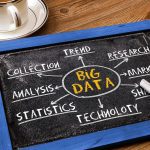People change jobs, get promoted and move home. Companies go out of business, expand and relocate. Every one of these changes contributes to data decay. Its been said that business databases degrade by around 30% per year, but why? A report by IDG states that companies with effective data grow 35% faster year-on-year. However, for this to happen your data needs to have a high … [Read more...] about Why does Data Decay so Fast and What to do About It?
Big Data
Learn everything you need to know about big data. Find out how companies are using this revolutionary technology and what it means for your business strategy.
How do the USA’s Slow Internet Speeds Impact Big Data Implementation
Many people think that internet in the US is the fastest in the world. The truth is that the internet network in the United States is fundamentally broken. It requires huge investments in order to compete with the nationwide networks of Norway, Japan, Singapore, South Korea and many other developed countries. You can use an internet speed test if you're curious about your own … [Read more...] about How do the USA’s Slow Internet Speeds Impact Big Data Implementation
Four Ways Big Data Improves the Medical Sphere
Big Data processing and analysis are penetrating the healthcare industry further and further. Telemedicine, EHR, wearables, and Internet of Things getting more and more popular, the medical sphere is accumulating more and more healthcare records. To make this data useful, practitioners need a convenient access to the information, as well as the ability to easily interpret and … [Read more...] about Four Ways Big Data Improves the Medical Sphere
Three Unexpected Ways How Big Data Influences Your Business
You can't make good decisions unless you have good information to support them. For instance, you can't justify hiring new workers unless you know that orders are up or customer traffic is higher in your store. Data can also help you decide whether or not to accept credit cards or whether to cater more to your online customers as consumer shopping preferences evolve. What are … [Read more...] about Three Unexpected Ways How Big Data Influences Your Business
Why Predictions Are Not Enough
In recent times, I have read a number of articles lamenting the frequent lack of value resulting from large-scale analytics and data science initiatives. While I have seen substantial value driven from many efforts, I have also seen examples where the results were very poor. My belief is that oftentimes the problems can be boiled down to one basic mistake. Namely, thinking that … [Read more...] about Why Predictions Are Not Enough
What is big data?
Big data is a term that refers to the massive amount of digital data created and shared every day. Big data can transform how we live, work, and communicate. It can be used to improve everything from public health and urban planning to business and marketing.
Big data is also changing the way we think about privacy and security. The volume, velocity, and variety of big data present challenges and opportunities for organizations and individuals. Regardless, big data is here to stay, and its impact will only continue to grow in the years to come.
What is big data analytics?
Big data analytics is the process of turning large, complex data sets into actionable insights. Businesses use various analytical tools and techniques, including machine learning and statistical analysis, to do this.
Big data analytics can be used to improve decision-making in areas like marketing, operations, and customer service. It can also be used to identify new business opportunities and optimize existing processes. With the help of big data analysis, businesses can gain a competitive edge by using their data better.
Want to learn more about big data? Datafloq has courses available. Contact us to get started.
When was big data introduced?
The term big data was coined in the 1990s, with some giving credit to John Mashey for popularizing the term. However, the concept of big data has been around for much longer.
Where does big data come from?
In the early days of computing, scientists and businesses began to realize that the amount of data being generated was increasing exponentially. As a result, they began to develop new methods for storing and processing data.
Over time, these methods have become increasingly sophisticated and have played a key role in enabling businesses to make sense of vast amounts of information. Today, big data is used in various industries, from retail to healthcare, and its importance is only likely to grow in the years to come.
What are examples of big data?
One of the most common examples of big data is social media data. With over 2 billion active users, Facebook generates a huge amount of data every day. This includes information on user interactions, posts, and even location data. Analyzing this data can help companies better understand their customers and target their marketing efforts.
Another example of big data is GPS signals. These signals are constantly being generated by devices like cell phones and fitness trackers. When combined with other data sets, GPS signals can be used to provide insights into everything from traffic patterns to human behavior. Finally, weather patterns are another type of big data set. By tracking these patterns over time, scientists can better understand the impact of climate change and develop strategies for mitigating its effects.
How do companies use big data?
Companies use big data in marketing, product development, and customer service. By analyzing large data sets, businesses can identify patterns and trends that would be otherwise difficult to spot. For example, a company might use big data to track customer behavior patterns to improve its marketing efforts.
Alternatively, a company might use big data to improve its products by identifying areas where customers are most likely to experience problems. For instance, big data can be used to improve customer service by finding pain points in the customer journey. Ultimately, big data provides companies with a valuable tool for gaining insights into their business operations.






